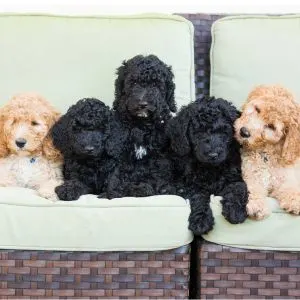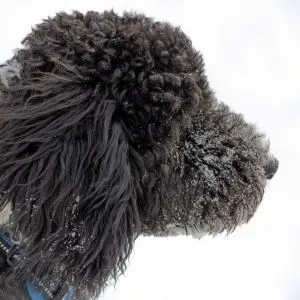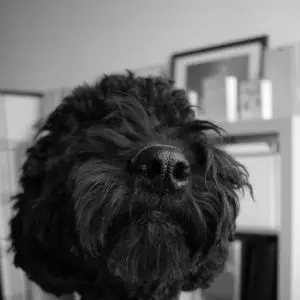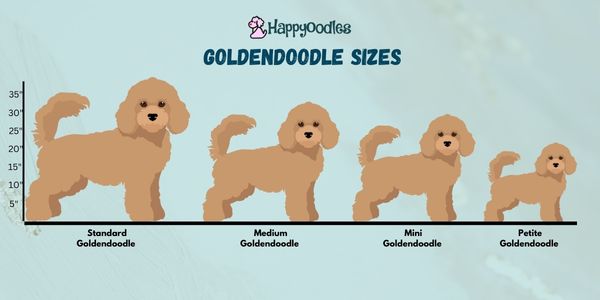Updated: 11/13/2023 with new pictures and info- If you’re thinking about welcoming a new furry friend into your life, you’ve come to the right place. Here we will take a look at the incredibly charming and lovable Black Goldendoodle and the black Mini Goldendoodle.
Now, you might be wondering, why choose a Black Goldendoodle? Well, there are plenty of reasons to fall head over heels for these fantastic four-legged companions.
Their striking black coats are not just unique; they’re also generally low-shedding, making them a top choice for those with mild pet allergies or a penchant for a tidy home.
But that’s not all. Black Goldendoodles are renowned for their playful and affectionate personalities. They’re a bundle of joy, always up for a game of fetch or a snuggle session on the couch. Plus, these lovable canines are incredibly intelligent and easy to train.
Join us as we uncover how they are black, plus insights into their characteristics, care needs, and why they stand out among other breeds.

Quick Facts About the Black Goldendoodle
| Dog Breed | Crossbreed – Golden Retriever with a Poodle |
| Sizes | Teacup or petite, mini, medium and standard |
| Height | 8 and 23 inches tall at shoulder |
| Weight | 7 to 120 pounds |
| Lifespan | 12 and 15 years |
| Traits | Social, outgoing, playful and intelligent |
| Training | Eager to please and easy to train with proper guidance |
| Maintenance | High coat maintenance requirements. |
All about the Black Goldendoodle

Black Goldendoodle Breeding
The Black Goldendoodle is a hybrid dog that is the result of breeding a purebred Golden Retriever with an Black purebred Poodle. While a first generation crossbreed can result in a black goldendoodle puppy, they are more commonly found in later goldendoodle generations. Especially if the poodle parent is black in all generations.
Goldendoodles are often referred to as a designer breed, which fits since breeders are able to direct both the size and color of the puppies through careful breeding and a knowledge of canine genetics. In addition to all black dogs, they can also breed goldendoodles that are black with white markings or white patches

Can Goldendoodles be Black?
Yes. While the most common fur colors tend to be cream, apricot and of course Golden, Goldendoodles can also be black, brown or gray.
What makes a Goldendoodle black?
To get a black Goldendoodle, a puppy must inherit at least one dominant “KB” allele (gene) for black color from the black Poodle parent, along with a dominant “Em” allele for the even distribution of black pigment to be all black.
But, let’s take a step back.
All dogs have eumelanin and pheomelanin, which are types of melanin pigment that is found in dogs. Eumelanin is responsible for producing black and brown colors in a dog’s coat. Pheomelanin is responsible for producing red and yellow colors in a dog’s coat.
There are also other genes that control the strength and distribution of pigment. These genes create the various shades of black, brown, red, yellow coats and can even result in a white Goldendoodle.

Poodle and Golden Retriever Coat Genetics
If we look at the black Poodle it carries at least one dominant “KB” allele at the K locus (which is responsible for the black coat color) and at least one dominant “Em” allele at the E locus (associated with even distribution of black pigment), contributing the genetic instructions for black color and its proper spread in the coat.
In contrast, the typical genetic makeup of a Golden Retriever genes involves two recessive “ky” alleles at the K locus (resulting in a non-black coat color) and two recessive “e” alleles at the E locus (leading to limited distribution of black pigment). The result of this is a non-black coat of red and yellow.
When these two breeds are bred together, their offspring inherit one set of genes from each parent.
To have Black Goldendoodle puppies, the offspring must inherit at least one dominant “KB” allele for black color from the Black Poodle parent, along with a dominant “Em” allele for the even distribution of black pigment.

Which Generation is best for a Black Goldendoodle?
Since a Goldendoodle needs at least one set of KBEm genes to be all black, a litter of first generation goldendoodles may not produce many black doodles. Even when the poodle used in breeding is all black
If you have your heart set on a black goldendoodle your best bet is to search for a second generation doodle. Either an F1b Goldendoodle, F2 Goldendoodle, F2b Goldendoodle or multigen doodle.
Note: Although I have researched the genetics of goldendoodle colors for my own understanding, I am not a Geneticist. Please refer to the resources listed below if you have any questions. Also please keep in mind that the world of canine genetics keeps changing as they discover new information.
Is the Goldendoodle the right dog for you? Join us to find out why the Goldendoodle is not for everyone.
Is the Black Goldendoodle a Purebred?
Currently the Goldendoodle is not considered to be a purebred and is not recognized by the American Kennel Club. However, it does have a breed club that is working towards this status.
To help facilitate this, the Goldendoodle Association of North America (GAMA) has created a Goldendoodle breed standard for members to follow.
Are Black Goldendoodles Rare?
Black Goldendoodles, while still relatively rare, are gaining in popularity. Currently, only a handful of breeders specialize in producing Black Goldendoodles.
However, this may shift in the future as more people seek these unique companions. It’s also common for breeders to have a few black Goldendoodles in litters that are primarily light-colored.

Black Goldendoodle Characteristics
What type of fur will a Black Goldendoodle have?
Like all Goldendoodles, Goldendoodle that are black can have different coat types, including a straight, wavy, curly or fleece coat:
- Straight Coat: This coat type is less common and is more akin to the Golden Retriever’s fur. It’s characterized by its sleek, flat appearance and is generally easier to maintain compared to curlier coats.
- Wavy Coat: The wavy coat is a blend of Poodle and Golden Retriever characteristics. It’s not as curly as a Poodle’s coat but has more texture than a Golden Retriever’s. This type of coat is often soft and slightly curly, making it one of the most popular and recognizable Goldendoodle fur types.
- Curly Coat: This is more similar to a Poodle’s coat. It’s tightly curled and can vary in density. The curly coat is known for being hypoallergenic, as it tends to shed less and is a good choice for allergy sufferers with mild symptoms.
- Shaggy Coat or Fleece Coat: Sometimes, Black Goldendoodles have a shaggy or fleece-like coat, which is a mix of wavy and curly. It’s plush, with a soft, textured feel, and requires regular grooming to prevent matting.

Do Black Goldendoodles Shed?
Since F1 Black Goldendoodles are rare, most black golden doodles are later generation doodles. This means there is generally more of the Poodle’s low-shed genetics in a Black Golden doodle resulting in a low shed coat.
The Genetics of Shedding
Scientists have discovered a specific version of a gene called MC5R that can influence shedding in dogs, including Poodles and Golden Retrievers. Shedding in dogs isn’t determined by just one gene though; just like with coat colors, it involves the interplay of multiple genes.
Researchers have also found a connection between shedding (known as the SD locus) and the presence of furnishings or improper coats (the F locus). Furnishings refer to the long facial hair on a dog’s beard and eyebrows.
If a dog, like a Poodle, has one copy of the SD variant (SD/n), they will shed moderately. On the other hand, if a dog, like a Golden Retriever, has two copies of the SD variant (SD/SD) and no furnishings (n/n), they are more likely to shed significantly.
Just keep in mind that all dogs shed some hair. But since Golden doodles require regular brushing and grooming, any hair that would normally fall out is generally caught in the brush or if not brushed regularly turns into matting.

Are Black Goldendoodles Hypoallergenic?
Pet allergies are believed to be caused by proteins that are found in a dog’s skin cells, saliva or urine. For some people with pet allergies, their allergies are triggered when they are exposed to a dog’s skin cells also known as dander, which become airborne when a dog sheds.
The idea is that if a dog doesn’t shed or sheds very little, there will be less dander in the environment to potentially set off allergic reactions. This is where Goldendoodles come into the picture since they can be selectively bred to shed minimally, reducing the likelihood of allergic reactions due to airborne dander exposure.
However, the key is to find a Goldendoodle with low shedding characteristics. The most reliable way to achieve this is by selecting a breeder who conducts genetic testing for the genes that relate to shedding.
It’s important to note that even if a dog doesn’t shed much, it’s not a guarantee that you won’t be allergic to them. Shedding dog dander is just one way people can come into contact with the allergy-causing protein.
Other common ways include being licked by a dog, petting them, brushing their coat, or cleaning up after them.
To ensure you won’t have an allergic reaction, it’s advisable to spend time with the dog before bringing them home. This can help you assess your potential for allergies in a real-world context.

Does a Black Goldendoodle have a good temperament?
The temperament of a Black Goldendoodle, like other Goldendoodles, is influenced by various factors, including genetics, socialization, and individual personality. Generally, Goldendoodles are known for having friendly and affectionate temperaments. They are often described by their owners as loving, sociable, and eager to please.
- Friendly and social – All Goldendoodles tend to be very friendly and social dogs. If properly socialized as a puppy, they can get along well with other dogs, pets, and people, making them great family pets. They are known for their affectionate nature and enjoy being around their human family members.
- Intelligent – Goldendoodles are intelligent dogs, and their intelligence is inherited from both parent breeds. This intelligence makes them quick learners and responsive to positive training. They often excel in obedience training and can learn commands and tricks relatively easily.
- Active – Goldendoodles are known for their active, playful nature. They often enjoy interactive games, fetch, and outdoor activities.
The downside of these very social dogs is that they don’t like being alone. Leaving your Goldendoodle alone for long periods of time may lead to separation anxiety.

Trying to decide between a mini Goldendoodle and a standard Goldendoodle. Check out our post on the subject to see which one might be a better fit.
Do Black Goldendoodles Bark?
Standard Goldendoodles are not known to be excessive barkers. While they will let you know when someone comes to the door, they do not bark without a purpose.
Mini Goldendoodles may bark more than a standard Goldendoodle. It has less to do with the breed and more to do with fear. Therefore, it’s important that you properly socialize them early on.
What Size Do Black Goldendoodles Come In?
The Black Golden-doodle can be found in the same size ranges as the more popular cream Goldendoodles.

Black Goldendoodle Sizes
- Standard: Height: over 21 inches (53cm to 63cm) at wither, Weight: 51 pounds or more.
- Medium: Height: between 17 inches and 21 inches (43cm to 52cm) at wither, Weight: typically between 36-50 pounds.
- Miniature (aka mini Goldendoodle): Height: between 14 inches and 17 inches (35cm to 42cm) at wither, Weight: typically between 26-35 pounds.
- Petite (aka micro mini or toy) : Height: up to 14 inches. Weight: Typically 25 pounds or less

Are Black Goldendoodles hard to train?
With proper training black Goldendoodles are generally known for their trainable and social nature. They are often quick learners and respond well to training when done consistently and with positive reinforcement. Their intelligence makes them eager to please and adaptable to various commands and tasks.
Socialization is an important aspect of raising a well-rounded Black Goldendoodle. Early and ongoing socialization with people, other dogs, and different environments is essential to help them become well-adjusted and confident adult dogs. Proper socialization helps prevent behavioral issues and encourages positive interactions with others.
Do Black Goldendoodles have Health Issues?
Goldendoodles are an overall healthy breed and the color of a Goldendoodle does not affect their health. But like all crossbreeds the Goldendoodle can develop health conditions that are associated with both the Golden Retriever and Poodle.
Goldendoodle health concerns include:
- Ear Infections: Goldendoodles are prone to ear infections, thanks to their long hairy ears that can reduce air flow and increase moisture.
- A skin disease called Sebaceous adenitis
- A heart condition called Subvalvular Aortic Stenosis,
- Hip dysplasia: This is a condition in which the thigh bone becomes displaced from the hip joint. It has a strong genetic component and can be avoided through genetic testing
- Addison’s disease
- Progressive retinal atrophy, cataracts and glaucoma – These are all types of eye disorders
- Von Willebrand’s disease which is a blood condition that affects clotting
To minimize the risk of buying a dog with health issues, look for Goldendoodle breeders that can show proof of health testing on parent dogs.
Do not buy a puppy from a breeder that cannot provide you with written, verifiable documentation that the parents were cleared of common genetic health issues that are known to affect the breed. And of course stay away from puppy mills.
Goldendoodle Lifespan
The lifespan of a Black Goldendoodle can vary based on several factors, including genetics, overall health, diet, and quality of care. On average, black Goldendoodles typically have a lifespan of about 10 to 15 years.
Proper nutrition, regular exercise, routine veterinary care, and a loving home environment can all contribute to a longer and healthier life. Additionally, responsible breeding practices that prioritize the health and genetic diversity of the breed can have a positive impact on lifespan.

Are Black Goldendoodles high maintenance?
Yes, all Goldendoodles can be considered high maintenance regardless of their color. But it really depends on your definition of high maintenance and what type of coat your dog inherits.
On one hand they can shed much less than a Golden which means less time cleaning fur off floors and clothes. But on the other hand they require more time spent grooming them to keep their fluffy coats in good shape.
This includes weekly brushing to keep them from matting. Goldendoodles with long, or curly hair need daily brushing.
In addition to the frequent brushing Goldendoodles need to have their hair trimmed every 4 to 6 weeks if they inherit the continuously growing hair of the poodle.
Professional grooming costs for a Goldendoodle can start at $75.00 and go up from there depending on how big your Goldendoodle gets and the amount of matting. Some groomers charge a dematting fee on top of the regular cost of grooming.
You can also choose to groom your doodle at home. It will take 2 to 3 hours every 4 to 6 weeks to keep your doodle looking their best.
Exercise requirement of the Black Goldendoodle
The exercise requirements of a Black Golden doodle can vary depending on factors such as age, individual temperament, and overall health. However, here are some general guidelines you can follow:
- Goldendoodles typically require a moderate amount of exercise to stay happy and healthy. This generally translates to around 60 to 90 minutes of exercise per day. This can be achieved with regular daily walks and off-leash playtime.
- Playtime can be in the form of games of fetch, interactive toys, and play sessions with their owners. Engaging in play helps them expend energy and stimulate their minds.
- Daily walks of 20 to 30 minutes can also be used as an opportunity for socialization.
- Goldendoodles are intelligent dogs, and mental stimulation is just as important as physical exercise. Engage their minds through obedience training, puzzle toys, and interactive games.
- Many Goldendoodles enjoy swimming, thanks to their Golden Retriever and poodle heritage. If you have access to a dog-friendly body of water, swimming can be an excellent form of exercise.
Feeding requirements of a Black Goldendoodle
The amount you should feed your Goldendoodle depends on several factors, including their age, size, activity level, metabolism, and the type of food you’re providing. It’s essential to consult with your veterinarian to determine the specific dietary needs of your individual dog. However, here are some general feeding guidelines:
- Quality Matters: Choose a high-quality dog food that meets your dog’s nutritional needs. Look for options that list a meat source as the first ingredient and avoid foods with excessive fillers or artificial additives.
- Check the Dog Food Label: Check the feeding guidelines on the dog food label. These guidelines typically provide recommended serving sizes based on your dog’s weight. However, they are just rough estimates and may need adjustment based on your dog’s specific needs.
- Consider Age and Life Stage: Puppies, adult dogs, and seniors have different nutritional requirements. Be sure to select a dog food appropriate for your Goldendoodle’s life stage.
- Divide Meals: Feeding your Goldendoodle two or three meals per day is often recommended to prevent overeating and promote healthy digestion.
- Treats and Snacks: Be mindful of treats and snacks, as they can add extra calories to your dog’s diet. Limit treats and choose healthy options.
- Water: Ensure your Goldendoodle has access to fresh water at all times.
Remember that Goldendoodles can vary in size. Smaller dogs generally require less food than larger ones. Additionally, active dogs may need more calories than sedentary ones. Regularly assess your Goldendoodle’s body condition and consult with your vet if you have any concerns about their weight or dietary needs.

More Black Goldendoodle FAQ’s
Where can you find a black Goldendoodle puppy?
The most common way to find a Black Golden doodle is to look for a breeder that purposely breeds them. You can also look for a Black Goldendoodles, at breeders that breed Goldendoodles in all colors.
When looking for a breeder you want to do your best to look for a reputable breeder that does genetic health testing. You can look for them on the Goldendoodle Association of North America (GANA) breeders list.
You can also look for one at rescue organizations or local shelters. Here are a few Goldendoodle rescue groups listed by state.
Here are some more rescue resources by state to help you with your search:
- Best Goldendoodle Rescue in Florida (2023)
- Goldendoodle Rescue: 8 Best Rescues in Michigan (MI)
- Goldendoodle Rescue in Ohio: 8 Best Rescues in 2023
- Best Goldendoodle Rescue in Indiana
- Goldendoodle Rescue: 8 Best Rescues in Georgia (GA)
- 6 Best Goldendoodle Rescue in Pennsylvania (PA)
- Goldendoodle Rescue: 8 Best Rescues In Texas (TX)
- 4 Best Goldendoodle Rescue in New York (NY)
- 5 Best Goldendoodle Rescue in New Jersey (NJ)
A quick heads-up: While searching for a Black Golden doodle in a shelter, you might come across a Black Labradoodle that bears a striking resemblance to a Golden doodle.

How much is a black Goldendoodle?
You can expect to pay anywhere from $2,500 to $5,000 for a genetic health tested black Golden doodle. Prices are determined by size, location, fur type and popularity.
Do black Goldendoodles change color?
It is possible for a Black Golden doodle to inherit the dilute gene (also known as the melanophilin gene (MLPH)). This gene causes the dilution of the black genes, turning black fur to a “blue” or a gray color.
The dilute gene is common in poodles and can be passed on to its offspring. When this happens a puppy that is black may grow up to have gray fur when they are adults.

Cute names for Black Goldendoodles
Now that you have decided to get a Black Goldendoodle here are some cute names for them.
Names for male black dogs
- Ash
- Bandit
- Colby
- Corbin – Raven in french
- Flint
- Hershey
- Shadow
- Tar
Names for female black dogs
- Azur – Black in Egyptian
- Coco
- Luna
- Mica
- Mink
- Mittens
- Nova
- Noire – Black in French
For more names for black dogs check out our list at 499+ Best Black Dog Names, The Ultimate List of Ideas and Best Badass Black Dog Names for a Confident Pup.
Thank you for stopping by!
Black Goldendoodle Resources
- Coat color genetics can be fun and interesting at the same time; Embarkvet.com
- Black K and A Locus; DogGenetics.co
- Coat Color Genetics in Retrievers
- Dog Coat Genetics Explained: Wikipedia
- Goldendoodle Association of North America (GAMA)
- Labradoodle Rescue: 14 Best Places to Get a Labradoodle
- Mini Goldendoodle: Your Up-To-Date Guide for 2021
- Breed review by Embrace; Goldendoodles
- https://animalgenetics.com/dog-tests/canine-trait-tests/186-shedding/
